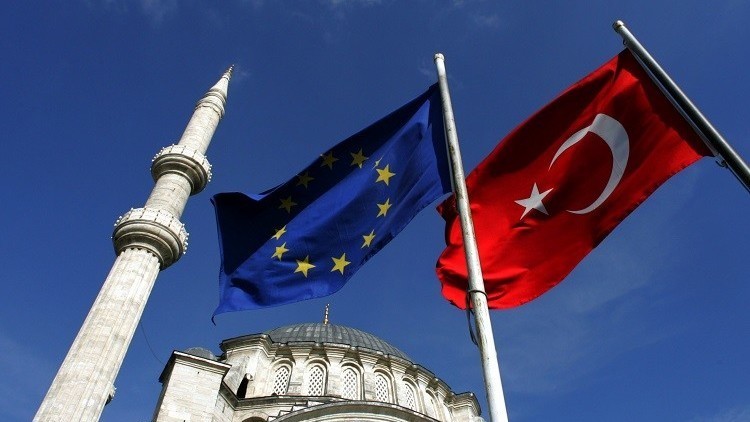EU keeps channels open to Erdoğan, focuses on rights
Murat Yetkin/ Daily News
26 مايو 2017

The nightmare scenario did not happen. The ties between Turkey and the European Union were not severed as a result of President Tayyip Erdoğan’s discussions in Brussels on May 25 at the NATO summit there.
Not only did the EU’s top officials choose not to break off political relations with Turkey, but so did the leaders of three influential European countries, France, Germany and the United Kingdom, despite their harsh criticism of Erdoğan and the situation regarding rights and freedoms.
Despite the public pressure in their respective countries to isolate Turkey because of the criticisms over judicial independence and media freedom, especially after the July 15, 2016 foiled military coup and the resultant state of emergency, EU leaders seemingly decided to try to improve relations through dialogue.
The problems are still there. Donald Tusk, the president of the European Council, said on his Twitter account after meeting Erdoğan and European Commission President Jean-Claude Juncker that they “discussed the need to cooperate.” “I put the question of human rights at the center of our discussions with” Erdoğan, he added.
There seemed to be a similar mood in Erdoğan’s talks with Emmanuel Macron of France, Angela Merkel of Germany and Theresa May of Britain: The problems are still there but the ties will not be cut; instead, there will be an effort to improve ties for the benefit of both Turkey and the EU.
According to Turkish presidential sources, the talks were conducted in a “positive atmosphere,” while Erdoğan also asked EU leaders to keep their promises to Turkey, especially due to the migration deal of 2016. Before departing for Brussels, Erdoğan listed them as the provision of visa flexibilities to Turkish citizens in the Schengen zone, support for Turkey in handling the burden of nearly 3 million Syrian refugees in Turkey and the opening of new accession chapters.
Actually, opening accession chapters 23 and 24 on the judiciary and freedoms could provide a win-win opportunity for all. For Turkey, it would be a sign that there is an improvement in relations with EU; for the EU, it would offer leverage to discuss those critical matters with the Turkish government and for the Turkish people, it could help improve the quality of democracy and rights in the country. The problem is that both chapters are blocked by the Greek Cypriot government.
Additional details might help provide a deeper analysis, but the first impression suggests that European leaders have said what they wanted to say to Erdoğan in person and that the meetings themselves provided a test for Erdoğan that showed there is still room to maneuver to reanimate relations with the West after all those – ongoing – arguments with EU governments regarding the anti-terror fight and the situation of rights in Turkey.
That mood may have positive reflections in both Turkish foreign policy and domestic politics. For example, if Erdoğan’s assessment of the situation is also positive, we could assume that the reinstitution of the death penalty issue will be shelved, while an evaluation of the complaints on mass detentions and dismissals from public jobs could also be accelerated, since an improvement in relations with the EU is impossible without a corresponding improvement in rights and freedoms.
 عن أمل جنبلاط المتجدد: لبنان يستحق النضال
عن أمل جنبلاط المتجدد: لبنان يستحق النضال
 صحافيون أم عرّافون!
صحافيون أم عرّافون!
 ماذا يجري داخل أروقة بيت الكتائب المركزي؟
ماذا يجري داخل أروقة بيت الكتائب المركزي؟


 عن الخرائط التي تُرسم والإتفاقات التي تتساقط!
عن الخرائط التي تُرسم والإتفاقات التي تتساقط!
 “الإنحراف في الحياة”/ بقلم كمال جنبلاط
“الإنحراف في الحياة”/ بقلم كمال جنبلاط
 هاشتاغ #صار_الوقت يحل أولاً في حلقة جنبلاط
هاشتاغ #صار_الوقت يحل أولاً في حلقة جنبلاط
 طاولة نقاش عن أزمة الصحافة في جامعة AUST
طاولة نقاش عن أزمة الصحافة في جامعة AUST
 عبدالله: ليظهر لنا وزير مكافحة الفساد حرصه في صفقات البواخر والفيول
عبدالله: ليظهر لنا وزير مكافحة الفساد حرصه في صفقات البواخر والفيول
 عبدالله: غريب أمر وزارة مكافحة الفساد!
عبدالله: غريب أمر وزارة مكافحة الفساد!

 Comment to Uri Avnery: How Sad What Is Looming Ahead
Comment to Uri Avnery: How Sad What Is Looming Ahead
 “Not Enough!”
“Not Enough!”
 … لمن لم يقرأ يوسف البعيني/ بقلم وسام شيّا
… لمن لم يقرأ يوسف البعيني/ بقلم وسام شيّا
 كمال جنبلاط في مولده الأول بعد المائة: تعاليمه وأفكاره ما زالت الحلّ/بقلم عزيز المتني
كمال جنبلاط في مولده الأول بعد المائة: تعاليمه وأفكاره ما زالت الحلّ/بقلم عزيز المتني
 رئيس حزب/ وليس (… سابقاً)/ بقلم د. خليل احمد خليل
رئيس حزب/ وليس (… سابقاً)/ بقلم د. خليل احمد خليل
 التوازن السياسي في لبنان
التوازن السياسي في لبنان
 لبنان… مشاريع انقلابية مؤجلة
لبنان… مشاريع انقلابية مؤجلة
 جنبلاط وحَمَلة أختام الكاوتشوك
جنبلاط وحَمَلة أختام الكاوتشوك
 Le Liban est un symbole de tolérance
Le Liban est un symbole de tolérance
 Our Automated Future
Our Automated Future
 The True Origins of ISIS
The True Origins of ISIS
 Les Misérables vs. Macron
Les Misérables vs. Macron
 عذراً أيها المعلم/ بقلم مهج شعبان
عذراً أيها المعلم/ بقلم مهج شعبان
 رساله الى المعلم / بقلم ابو عاصم
رساله الى المعلم / بقلم ابو عاصم
 إلى روح القائد والمعلم كمال جنبلاط/ بقلم أنور الدبيسي
إلى روح القائد والمعلم كمال جنبلاط/ بقلم أنور الدبيسي
 أسرار وعناوين الصحف ليوم الجمعة 14 كانون الاول 2018
أسرار وعناوين الصحف ليوم الجمعة 14 كانون الاول 2018














